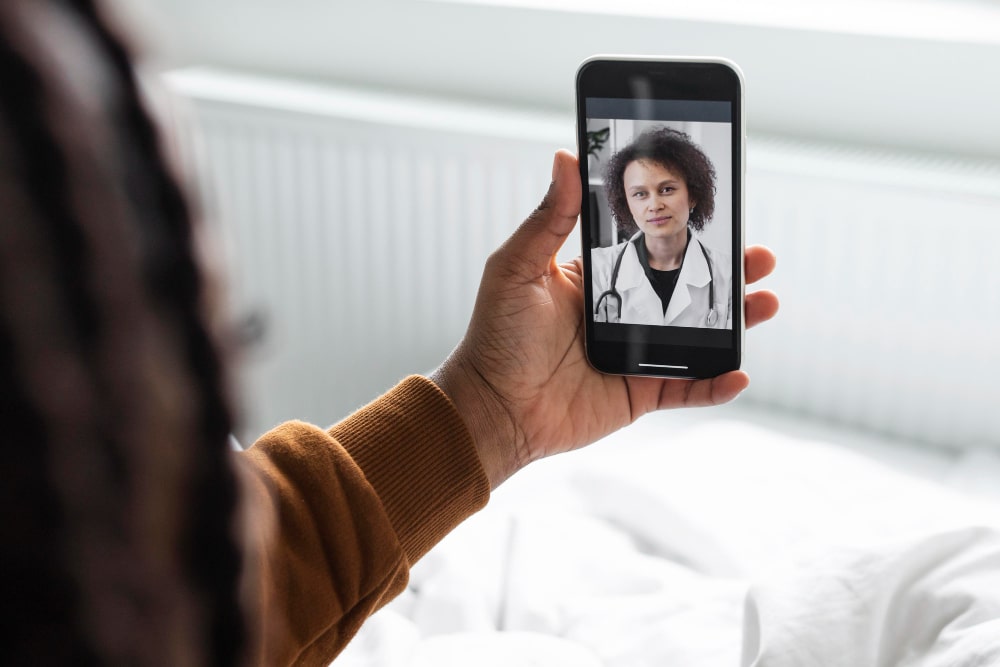What to Expect From Virtual Healthcare in 2022

Virtual healthcare is seeing a tremendous rise in popularity. Whether it’s to avoid Covid transmission or out of convenience, more and more people are turning to online doctor visits as a means of healthcare. Virtual healthcare provides a quick and easy solution to basic healthcare needs, from sinus infections to mental health appointments.
Online doctor appointments allow a patient to save time and money. No more travel time or long time wasted in waiting rooms. With internet service, camera and microphone, which is standard with phones and laptops, you can be connected to a doctor within minutes.
The changes in technology have allowed the medical field to offer these services, but offering online doctor appointments has changed how healthcare professionals practice medicine and the laws that govern it. As virtual healthcare grows, you can expect changes, so it is essential to look at what is in store for 2022.
What to Expect from Virtual Healthcare in 2022
The virtual healthcare market is growing at incredible speeds. The American virtual healthcare market is expected to reach revenues of over $3.5 billion by 2022. This revenue includes online doctor visits through audio, video, and kiosks.
These healthcare changes allow patients to receive fast treatment for non-urgent care and follow-up mental health appointments for ongoing treatments. The matter of convenience is allowing for patients to be seen more quickly than they would by visiting their primary care physician in the office or waiting to be seen in Urgent Care. It also prevents those offices from being backlogged by non-urgent appointments.
While many people are opting for virtual healthcare, many more still have not considered its benefits. Education is vital in expanding its reach.
What is New in Physical Health
Up until recently, chronic disease has been monitored by healthcare professionals at in-person health facilities. Chronic disease is the leading cause of death in America, and it is also the driving force behind the $3.8 annual healthcare costs. While utilizing online doctor appointments for acute symptoms, virtual healthcare is also becoming a preferred method of managing or proactively reclaiming your health. This is being done through holistic healthcare means and root-cause-based healthcare.
During COVID, many chronic disease patients began leaning on virtual healthcare to help manage their conditions. There are several benefits that make it a preferred choice such as:
- No transportation time or costs
- No need to take time off of work
- Eliminate the need for childcare
- No long waits to be seen
- No chance of catching other illnesses
When life has returned to normal and the pandemic is behind us, you can expect virtual care for chronic conditions to keep growing. With improved technology, increased access to specialists, more affordable and comprehensive options, and the growth of root-based-cause healthcare virtual care for chronic illness will be a preferred means of healthcare in 2022 and beyond.

Remote Patient Monitoring
Remote Patient Monitoring is a process that allows your healthcare provider to get a broad real-time view of how you are doing in real-time. A multitude of devices can be supplied to the patients by the healthcare staff, allowing for a constant stream of data to be provided to the doctor. These devices could be anything from a web-connected scale to an Oura ring. Whatever gives the healthcare professional a real-time view of the patient’s physical health to develop and adjust a personalized plan as needed.
Virtual Care vs Telemedicine
While most people are familiar with telemedicine appointments for acute symptoms such as earaches, they may not know they work hand in hand with remote patient monitoring. Virtual Care appointments help establish a patient’s needs at the beginning of their healthcare journey and may be needed again if things get out of balance along the way. Having the doctor constantly checking in lets them know of your personal needs so that you can make an online doctor appointment to make adjustments at any time.
Remote Diagnostics
Expect to see more healthcare professionals turn to remote diagnostics. This allows for a patient’s vitals to be monitored through diagnostic devices that connect through the computer and enable the healthcare professional to check the status of various health markers. Portable kits are being sold that contain devices such as otoscopes, stethoscopes, pulse oximeters. These devices help give doctors get a broader view when monitoring chronic diseases. These kits are typically reimbursable via your insurance or HSA.
What is New in Mental Health
Mental health visits became more popular with the onset of Covid, especially with smaller mental health offices. It was a way to continue the constant care that mental health patients needed to stick with their therapy and to check in with their doctor regarding their mental state and how they were doing with their medication.
Virtual Care offers mental health patients better access to online mental health clinicians, such as therapists and psychiatrists, making mental health easily available to people in rural areas where there might not be as many options.
Online mental healthcare is helping with the stigma surrounding mental health by making it more accessible and giving people options. It can be overwhelming waiting to be seen at a mental health practice where many people are waiting to be seen. But by providing the option for people to get help from the privacy of their own home it provides a level of comfort they might not have otherwise. Online mental health is rapidly growing and is expected to be one of the top 10 online medical specialties for 2020. Expect to see the client base grow due to the accessibility and privacy of online mental health visits.
Recently, CMS (Centers for Medicare & Medicaid Services) decided to allow Medicare to pay for mental health virtual visits, with certain conditions, like including the virtual healthcare visits provided by rural health clinics and federally qualified health centers. Also, the patient has an in-person visit within 6 months prior to the first virtual visit and at least once every 6 months afterward. Another stipulation is that doctors allow for audio-only appointments instead of video. The fact that Medicare is getting on board is a sign that virtual mental health appointments are here to stay.

How Covid Affected Online Healthcare
The use of telehealth services exploded during the pandemic. Many healthcare practitioners and small healthcare facilities moved to online visits, where applicable, to avoid spreading the virus. With the onset of the pandemic, many offices were not prepared for the influx of online doctor appointments and quickly had to adjust. Regulations as well had to be adjusted to accommodate the rising need for virtual healthcare. In this AMA video, Todd Askew, Senior Vice-President of Advocacy at AMA, mentioned how Covid-19 had moved us forward a decade in the use of telemedicine.
While restrictions have been temporarily lifted or modified, the question now is how to have them permanently adjusted to maintain the level of care being received through virtual healthcare. The AMA has reached out to Congress via the Physicians Grassroots Network, which is no longer an active campaign, to call on Congress to convince them to lift the geographic restrictions on telehealth services permanently. Unfortunately, as noted, this campaign has failed. However, other efforts are being taken in its place, like Senator Schatz’s CONNECT for Health Act.
CONNECT for Health Act
The CONNECT for Health Act was introduced by Senators Schatz, Wicker, Cochran, Cardin, Thune, and Warner and Representatives Black, Welch, and Harper. This bill has been introduced before and died on the House of Representatives floor. Senator Schatz believes that this act might now be passed between his bi-partisan support and the effects of the pandemic.
This act would pave the way for virtual healthcare by broadening the standards set by law to allow for Medicare and Medicaid acceptance. It matters if the CONNECT for Health Act approves telehealth for Medicare because it opens the door for all practitioners and changes the laws that govern online healthcare as a whole, such as permanently removing all geographic restrictions. Over 50 healthcare companies support the bill.
A Better Level of Care
No matter what, the future can only bring a better level of care for virtual healthcare. With the influx of patients due to Covid, healthcare agencies had to adjust quickly. Now they have had time to work out any kinks and improve early efforts of virtual care. Virtual healthcare already provides so many benefits that it is no wonder that the industry is growing with each passing year.
To recap some of the benefits:
- No travel time
- No in-office wait times
- Quickly get an appointment
- Easy access for those with mobility issues or in rural areas
- Eliminate childcare
- Eliminate chances of getting a new illness
Virtual healthcare options provide easy access to multidisciplinary healthcare facilities fitting all your healthcare needs are also the wave of the future. While healthcare offices with multidisciplinary teams are growing, they are few and far between if not in large metropolitan areas. Having access to them via online services affords patients a much better level of care.
Final Thoughts
Many of us have learned with Covid that some things are just not necessary, or at least they can be frequently avoided. From shopping for your groceries in the store to wasting hours at the doctor-only to find out that yes, the pain in your ear is, in fact, an earache.
When it comes to preventative health or functional medicine, virtual healthcare makes even more sense. Avoiding doctors’ offices filled with sick patients so you can manage your diabetes doesn’t seem practical at all. With root-based programs, like the ones at Ciba Health, you can get all your needs met with our multidisciplinary team from the comfort of your home. We are taking your virtual healthcare needs into 2022 and beyond. Get started with all the fantastic benefits of your plan by booking a call today.


